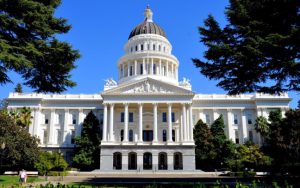Last week, the California Senate gave party-line approval to Assembly Concurrent Resolution 99, a resolution demanding people of faith in the state change how they teach, preach, and counsel others related to LGBT identities and behaviors. Authored by Assemblyman Evan Low (D-San Jose), ACR 99 condemns pastors, counselors, and religious workers who offer compassionate support to the fellow Californians struggling with unwanted same-sex attraction or gender identity confusion.
Most shockingly, ACR 99 goes so far as to blame the so-called “stigmatizing beliefs” of these individuals and organizations for the high rates of depression and suicide in the LGBT community. The resolution was a direct follow up to last year’s AB 2943 which California Family Council worked to defeat due to similar constitutional concerns. We strongly encourage you to read ACR 99 for yourself.
Thankfully, several senators recognized the serious legal flaws ACR 99, particularly its attack on the First Amendment. Senator Andreas Borgeas (R-Fresno) stated that even though the resolution didn’t have the force of law, “we are treading into freedom of speech territory that I think should concern all of us. When an individual seeks therapy or guidance before a religious leader, whether it be a mosque, a temple, or a church, that’s a private setting…To disallow or create the pathway where we tell individuals they can not say certain things should give us pause.”
Senator John Moorlach (R-Irvine) rose to warn legislators of the clear religious liberty implications of the legislation. He acknowledged that he does not support all of the counseling methods sometimes categorized as “conversion therapy.” But, “how can we foreclose on spiritual counseling when someone is on a journey and honestly inquiring about wanting to change and wants professional assistance?” Moorlach asked his fellow senators.
Sadly, other senators used ACR 99 as a platform to attack former LGBTQ men and women who seek to share their stories of life transformation. Scott Wiener (D-San Francisco) sneeringly called any efforts to change sexual orientation and gender identity “psychological torture.” Jim Beall (D-San Jose) smeared faith-based groups as engaging in “mental health malpractice.”
Senator Hannah Beth Jackson (D-Santa Barbara) implied change therapy discriminates against those who identify as LGBTQ. “Until recently, the interpretation of the First Amendment was that one religion could not impose itself on other religions,” she argued. To say “one should have religious freedom to discriminate against others is a relatively new concept.”
These slanderous statements were simply bizarre. ACR 99 does not clearly define so-called “conversion therapy.” It does not even mention psychologists, psychiatrists, or mental health professionals. Instead, it targets churches, counselors, and even formerly LGBTQ Christians. Sadly, these vitriolic and bigoted attacks on California’s faith community went largely unchallenged.
Just before the vote, Senate Minority Leader Shannon Grove (R-Bakersfield) rose to tell her colleagues she thought the resolution was simply to remind pastors to be loving and compassionate to LGBT identified people. While not mentioning the concerns raised by her Republican colleagues, Grove focused on the part of the resolution that called on “religious leaders to counsel on LGBTQ matters from a place of love, compassion.”
Grove later told California Family Council she had worked hard to organize meetings with Assemblyman Low and evangelical pastors in opposition to last year’s AB 2943, but she saw encouraging signs in this year’s resolution. “I’ve spoken before pastor groups all over the state,” Grove told other Senators, “and if they don’t counsel from a position of love and compassion and knowledge, then they shouldn’t be counseling people in that area.”
The final vote saw all 29 Democrats vote yes, with seven Republicans voting no, and four Republicans (Senators Shannon Grove (R-Bakersfield), Patricia Bates (R-Laguna Hills), Ling Ling Chang (R-Brea), and Scott Wilk (R-Lancaster) abstaining. As a resolution, ACR 99 does not require a signature from the Governor.
While the final result on ACR 99 was deeply disappointing, there are signs of hope. Stay tuned for several key updates on the next steps and our strategy moving forward.




